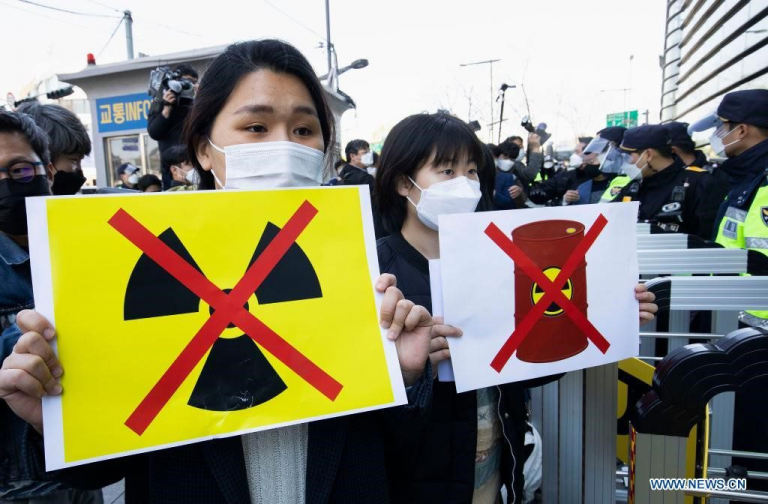
By Zhong Sheng, People’s Daily
On April 13, 2021, Japan unilaterally decided to release the Fukushima nuclear wastewater into the Pacific Ocean. Over the past two years, both the Japanese people and the international community have expressed strong concerns over the possible impacts of the decision.
Today, out of its own private interests, the Japanese government still intends to push ahead with its plan in total disregard of the global public interests and international law. It refuses to respond to the concerns of the international community, going further down the wrong path.
On March 11, 2011, a nuclear accident of the highest level occurred at the Fukushima Daiichi nuclear plant. Three reactor cores were melted and damaged, releasing a large amount of radioactive materials.
China and other neighboring countries of Japan expressed deep sympathy for the heavy disaster and offered timely humanitarian assistance to the Japanese government and people.
However, more than 10 years later, the Japanese government turned a deaf ear to the voices of the international community and decided to discharge the nuclear-contaminated wastewater into the sea, transferring the risks to all mankind. Such a practice is bitterly disappointing.
The wastewater had full contact with the melted cores during the Fukushima nuclear accident. It contains over 60 radionuclides, including carbon-14, iodine-129 and other radionuclides with extremely long half-lives.
The Japanese side claimed that the treated water to discharge is diluted, but it doesn’t plan to control the total volume of radionuclides. It said the treated water is harmless, but it is not willing to discharge the water into its own rivers or reuse it in Japan for alternative purposes, in manufacturing and agriculture for instance, as required by Pacific island countries. Japan’s move is totally self-deception.
The Japanese plan to release nuclear wastewater into the sea places Japan’s own interests above the public interests of the world. No such plan has been implemented in human history.
Japan should have conducted full consultations with stakeholders and international agencies to determine a safe disposal plan. However, it unilaterally announced the plan to release the wastewater into the sea, and gave limited authority to the International Atomic Energy Agency (IAEA) Task Force. It only allowed the team to evaluate its decided plan, and then claimed that the IAEA has “recognized” the plan of Japan.
Many countries have asked Japan to consider other options, such as long-term storage of the wastewater, but it has been totally ignored by the Japanese side due to economic considerations. The arrogant and irresponsible practice of Japan has a long-term negative impact on the country’s reputation.
Until now, the Fukushima nuclear accident has generated more than 1.3 million tons of nuclear-contaminated water, which is expected to be discharged into the ocean over a period of 30 years. The impact of the entire process is highly uncertain.
Nuclear-contaminated wastewater contains many radionuclides which cannot be treated effectively with existing technologies. Some long-lived radionuclides may spread with ocean currents and form a bio-concentration effect, which will multiply the total amount of radionuclides in the environment. The reliability of Japan’s Advanced Liquid Processing System (ALPS) and related projects, in the long run, is still in doubt.
According to statistics released by Japan this March, 70 percent of the treated wastewater still failed to meet the standards. Once released into the sea, the radioactive materials of the nuclear-contaminated wastewater will spread to most of the Pacific Ocean and, in 10 years, to the waters across the world, causing immeasurable harm to the marine environment and marine animals.
The discharge of nuclear wastewater into the sea has a global impact. According to provisions in general international law and the United Nations Convention on the Law of the Sea, Japan has the obligation to take all possible measures to prevent pollution of the environment, the obligation to notify and fully consult with states likely to be affected, the obligation to assess and monitor the environmental impact, the obligation to take precautions to minimize hazardous effects, the obligation to ensure transparency, and the obligation to engage in international cooperation.
However, the Japanese side has been shunning its responsibilities and obligations under various pretexts. It updates countries unilaterally on its preparation for the discharge, and has never comprehensively responded to the science-based questions raised by technical departments from China and Russia. The country cannot win the trust from the international community.
Japan’s practices on the disposal of nuclear-contaminated wastewater, an issue concerning major international public interests, are far from the expectations of the international community.
Japan should immediately stop its preparations for releasing the nuclear wastewater into the sea, carry out full and meaningful negotiations with its neighboring countries and international organizations, and seek the optimal solution, so as to ensure the contaminated wastewater is treated in a science-based, open, transparent and safe manner under strict supervision from the international society.
(Zhong Sheng is a pen name often used by People’s Daily to express its views on foreign policy and international affairs.)










